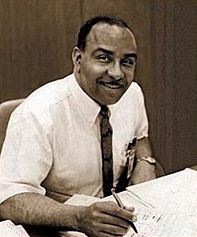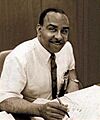W. Harry Davis facts for kids
Quick facts for kids
W. Harry Davis
|
|
|---|---|

Davis published his memoirs in 2002 and 2003.
|
|
| Born | April 12, 1923 Minneapolis, Minnesota, U.S.
|
| Died | August 11, 2016 (aged 93) |
| Occupation | Civic leader, businessman, boxing coach |
| Employer | Onan, Star Tribune, Cowles Media Company |
| Known for | Civil rights activism, desegregation, Golden Gloves boxing, public education |
| Political party | Minnesota Democratic-Farmer-Labor Party |
| Spouse(s) | Charlotte Davis |
| Children | Rita Lyell, Harry Davis Jr., Richard Davis, Evan Davis |
William Harry Davis, Sr. (born April 12, 1923 – died August 11, 2006) was an amazing American leader from Minneapolis, Minnesota. He was a civil rights activist, a boxing coach, a community leader, and a businessman. Harry Davis overcame many challenges, like growing up poor, having polio as a child, and facing unfair treatment because of his race. He became a kind and helpful person who made a big difference.
People remember Davis for his friendly and positive attitude. He coached many Golden Gloves boxing champions. He also managed the Olympic boxing team that won nine gold medals! Harry Davis helped improve public education in his city. He was a key leader in the Civil Rights Movement, working to end segregation and help all Americans find equality.
Contents
Harry Davis's Life Story
Growing Up in Minneapolis
Harry Davis was born in 1923. His mother was Elizabeth Jackson, known as Libby. His father was Lee Davis, a Dakota Sioux man who played baseball for the Kansas City Monarchs. Harry grew up in a poor area of north Minneapolis.
When Harry was just two or three years old, he became paralyzed from the waist down because of polio. His mother, Libby, helped him get better using special massages and warm water wraps. She learned these treatments from her ancestors. Harry was the first African-American student at Michael Dowling School for Crippled Children. He received a lot of help there from doctors.
Harry was known as Little Pops when he was young. He spent a lot of time at the Phyllis Wheatley settlement house. This place offered a safe space and extra education for kids after school. Harry learned boxing, good manners, and how to run meetings there. He even met famous musicians like Duke Ellington! In 1941, he finished North High School, where he won a city championship in boxing. Later, he went to the University of Minnesota. He also received an honorary law degree from Macalester College.
Harry Davis and his wife, Charlotte, were married for 61 years. Charlotte was also a strong community leader. They had four children: Rita, Harry Jr., Richard, and Evan.
Making a Difference
Coaching Golden Gloves Boxing
The Phyllis Wheatley settlement house taught amateur boxing for exercise and fun. It also helped kids learn self-defense and avoid street fights. In the 1940s, Harry Davis started the center's competitive boxing program. He also coached basketball, football, and baseball. He served on the center's board for 30 years.
Between 1945 and 1960, Phyllis Wheatley won most of the boxing championships in the upper Midwest. This area included Minnesota, North Dakota, South Dakota, and Wisconsin. Harry Davis became the most successful coach in the region and was a vice president of Golden Gloves. He taught his students to use their skills wisely. He also taught them three important principles: body, mind, and conscience.
Some of his famous students included Clyde Bellecourt, who helped start the American Indian Movement. Another student, Jimmy Jackson, won a national Golden Gloves championship in 1957. Harry Davis was later honored by being put into the Golden Gloves Hall of Fame.
Leading His Community
In 1945, Harry Davis joined the National Association for the Advancement of Colored People (NAACP). This important organization works for equal rights for all people. Davis had a big impact on the NAACP throughout his life.
In 1966, Davis and eight other people started the Twin Cities Opportunity Industrialization Center (TCOIC). This program helped local African Americans get job training.
In 1967, after some problems in other U.S. cities, there was unrest in the African-American neighborhood around Plymouth Avenue in north Minneapolis. Some buildings were set on fire. Harry Davis worked with Mayor Arthur Naftalin to calm things down between the community and the police. During this time, Davis also worked on the War on Poverty, which was a government effort to help people escape poverty. He also started the Urban Coalition of Minneapolis.
Davis served on the Minneapolis school board for 20 years. He became the chairman in 1974. A judge ordered Minneapolis to fix the problem of schools being separated by race. To make sure schools had a mix of students from different backgrounds, they tried closing some schools, busing students, and changing school zones. Harry Davis continued to work on school issues even in 2006.
Running for Mayor
Minneapolis was a fairly open-minded city, but racial segregation was still common across the United States. After the assassination of Martin Luther King Jr. in 1968, there were sometimes clashes with police. To help bring peace, Harry Davis agreed to run for mayor in 1971. He ran against the current mayor, Charles Stenvig. Davis later called Stenvig his friend.
Harry Davis became the first African-American person to run for mayor of Minneapolis with support from a major political party. This was a very brave step. When schools started to integrate in the 1960s, black families sometimes faced scary threats in Minneapolis. These problems were still present in 1971. The Davis family received daily threats during the campaign. The FBI brought them guard dogs, and the police had to guard their home.
Even though Stenvig won the election, Harry Davis earned the respect of many people. Former Minneapolis Mayor Arthur Naftalin said, "Harry was willing to be a human bridge between black and white when this city really needed one."
Around this time, other large U.S. cities elected African-American mayors. Cleveland elected Carl Stokes in 1967. Newark, New Jersey, elected Kenneth Gibson in 1970. In 1973, Thomas Bradley won in Los Angeles, and Maynard H. Jackson won in Atlanta. Minneapolis elected its first black mayor, Sharon Sayles Belton, in 1994. She served until 2001.
Working at the Star Tribune
Harry Davis was well-known to the Minneapolis newspapers because they often covered Golden Gloves boxing. He became the city's first important black business executive that many white people recognized.
He started working at the Star Tribune newspaper in 1973. He became an assistant vice president in public affairs and employee services. When he retired in 1987, he was a vice president for the paper's parent company, Cowles Media.
Managing Olympic Boxing
Harry Davis was part of the United States Olympic boxing committee in the 1970s and 1980s. He was the team manager for the U.S. Olympic boxing team. This meant he was in charge of making sure the team was well cared for, including their lodging, travel, and medical needs.
In 1976, he managed the team for the Summer Olympics in Montreal. In 1980, the United States decided not to send its team to the Summer Olympics in Moscow.
In 1984, the Olympics were held in Los Angeles. Harry Davis was again the team manager for the United States. The U.S. team had an amazing performance! They won nine gold medals and one silver medal. This was the best record for U.S. Olympic boxing, except for when the U.S. competed alone in 1904.
| United States Olympic Boxing in Los Angeles, 1984 | ||||
|---|---|---|---|---|
| First | Second | Third | Weight | |
| Paul Gonzales, USA | Salvatore Todisco, ITA | Marcelino Bolivar, VEN Keith Mwila, ZAM |
Light Flyweight | |
| Steve McCrory, USA | Redzep Redzepovski, YUG | Ibrahim Bilali, KEN Eyüp Can, TUR |
Flyweight | |
| Maurizio Stecca, ITA | Héctor López, MEX | Pedro Nolasco, DOM Dale Walters, CAN |
Bantamweight | |
| Meldrick Taylor, USA | Peter Konyegwachie, NGR | Türgüt Aykaç, TUR Omar Catari, VEN |
Featherweight | |
| Pernell Whitaker, USA | Luis Ortiz, PUR | Chun Chil-Sung, KOR Martin Ndongo-Ebanga, CMR |
Lightweight | |
| Jerry Page, USA | Dhawee Umponmaha, THA | Mircea Fulger, ROM Mirko Puzović, YUG |
Light Welterweight | |
| Mark Breland, USA | An Young-Su, KOR | Luciano Bruno, ITA Joni Nyman, FIN |
Welterweight | |
| Frank Tate, USA | Shawn O'Sullivan, CAN | Christophe Tiozzo, FRA Manfred Zielonka, FRG |
Light Middleweight | |
| Shin Joon-Sup, KOR | Virgil Hill, USA | Aristides González, PUR Mohamed Zaoui, ALG |
Middleweight | |
| Anton Josipović, YUG | Kevin Barry, NZL | Evander Holyfield, USA Mustapha Moussa, ALG |
Light Heavyweight | |
| Henry Tillman, USA | Willie DeWit, CAN | Angelo Musone, ITA Arnold Vanderlyde, NED |
Heavyweight | |
| Tyrell Biggs, USA | Francesco Damiani, ITA | Aziz Salihu, YUG Robert Wells, GBR |
Super Heavyweight | |
Later Years and Legacy
Harry Davis received at least 79 awards for his community leadership. In 2002, a middle school in Minneapolis was renamed W. Harry Davis Academy in his honor. A foundation, an award, and a scholarship also carry his name.
Davis wrote his autobiography, Overcoming, in 2002. In 2003, he published Changemaker. This book was a history of the civil rights movement in Minnesota, written for young readers.
Harry Davis passed away in 2006, a few years after his wife, Charlotte. He is remembered as a true hero who worked tirelessly for equality and helped many people.
Images for kids
 | Janet Taylor Pickett |
 | Synthia Saint James |
 | Howardena Pindell |
 | Faith Ringgold |


